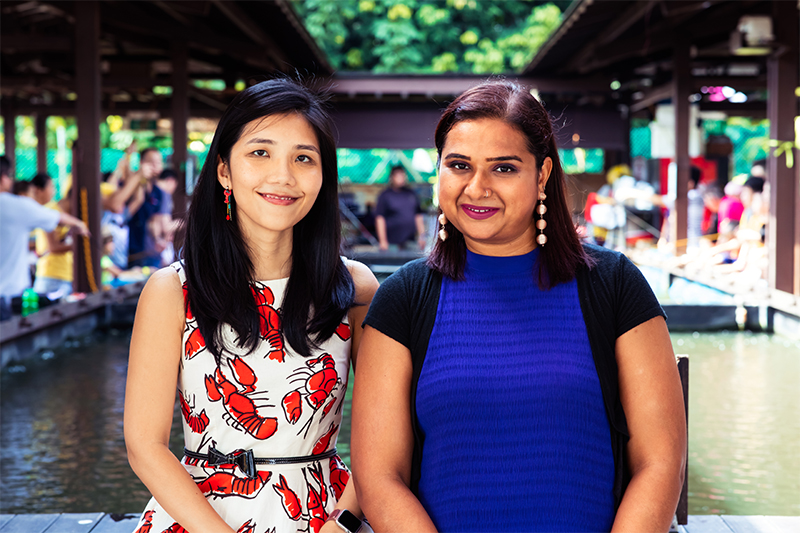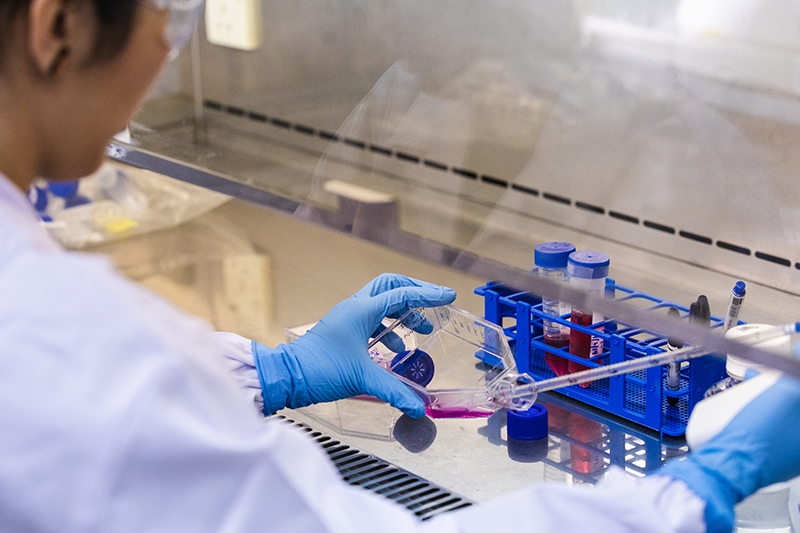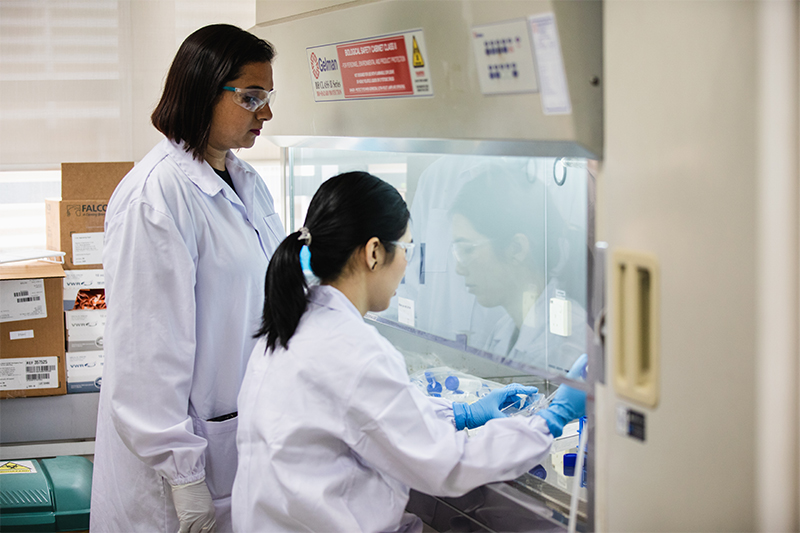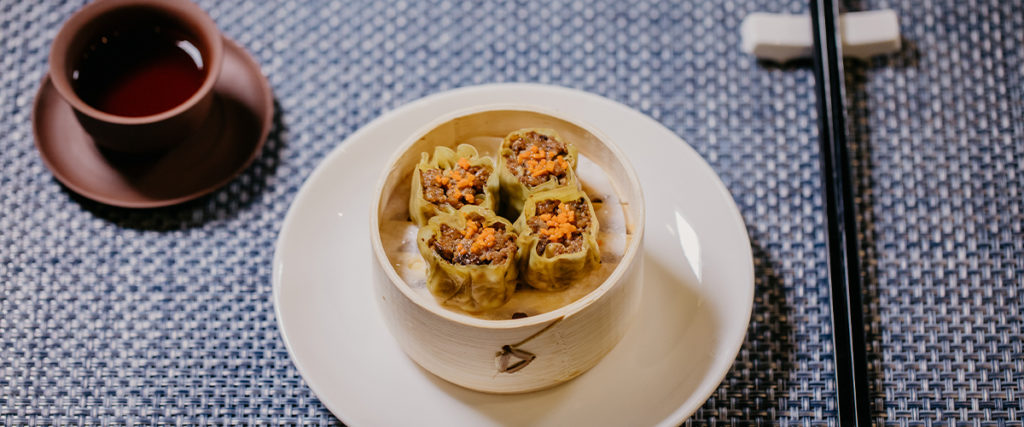The two women behind Shiok Meats, Asia’s first cell-based meat company, want to serve the world lab-grown shrimp. Read on to discover the next sustainable food offering on the horizon.
Hot on the heels of the meatless burger, a Singaporean food startup is making a play for one of Asia’s favourite food sources by developing a way to serve up lab-grown shrimp. Shiok Meats produces fresh shrimp proteins by growing high-quality marine animal cells. “It’s not lab food. It’s not vegetarian. With cell-based meats, the story is more natural. It is real meat,” explains Dr Sandhya Sriram, a cell biologist and the company’s Co-Founder and CEO. Imagining a future where people may one day be able to 3D-print shrimp on their kitchen countertops, the entrepreneur wants not only to deliver a sustainable food source, but also tweak its chemical make-up, reducing its saturated fat and bad cholesterol contents to produce a nutrient-rich meal. She talked Hive Life through her vision of a future in which seafood no longer needs to be fished out of the sea.

While companies like Beyond Meat and Impossible Foods have become household names for creating plant-based burgers that ‘bleed’ just like real meat, there’s another food category seeking an even more innovative and sustainable substitute for traditional meat: cell-based protein. For Shiok Meats, the focus is all on seafood. “Since clean meat first started in the West where red and white meat is consumed more than seafood, most of those companies work on ‘meat,’” explains Sandhya. “Beyond and Impossible are plant-based companies. They have to use a lot of additives to get taste and nutrition right. There are about five companies across the world working on cell-based seafood and we hope this industry grows.”
Inspired by Dr Mark Post, the man behind the first lab-grown beef burger, Sandhya, who is a vegetarian by choice, wanted to use her skills and knowledge to do something good for mankind and the environment. So, she went to her mentor, friend and angel investor Ryan Bethencourt. A scientist and the Co-Founder and CEO of Wild Earth, a plant-based protein pet food startup, he is also a Partner at Babel Ventures, a biotech VC fund. On the hunt for a CTO to help her get the idea off the ground, she then met her Co-Founder Dr Ka Yi Ling, a developmental biologist with over nine years expertise in studying stem cells during development. “We connected over wanting to work on scientific research that translated into a product extending beyond the publishing side of academics and not falling into the trap of ‘publish or perish,’” she explains of their coming together. “Starting our own company gives us the freedom to pursue the ‘right’ kind of science.” And for them, over the past five years, that science has been entirely focused on crafting the world’s first source of ‘clean shrimp.’
You might also like The Impossible Burger

“If you were to break down a piece of meat or fish, it’s made up of muscle, fat, connective tissue, blood and a couple of other cells,” explains Sandhya. “We use stem cells from a live shrimp and grow them in billions of numbers in a nutrient mix to make meat. Instead of breeding, grooming and raising the animal, we only cultivate the edible parts. There is zero wastage. The taste is inherent and we do not need to add anything for its smell.” For her, looking to seafood was an obvious place to start. “Since Shiok Meats is based in Asia, we wanted to look at a type of food that was consumed in large quantities. Crustaceans (shrimp, crab, lobster) are a major part of our diet and one of the dirtiest in terms of farming. Moreover, the way we are consuming seafood is unsustainable and harmful to the environment, as well as to animal and human health.”
Their patent-pending tech has been created specifically for crustaceans, but the base technology of making meat out of stem cells can be applied to make any kind of animal protein. Cell-based meat replaces animal protein, but still provides meat for consumption with the same taste and nutritional profile. “It is clean as we do not use antibiotics or hormones to grow clean meats,” says Sandhya. However, the process doesn’t come without major challenges. “Growing the meats in the numbers required to feed everyone, whilst also reducing the cost of production, has proven to be a very difficult task. But, we will get there in the next couple of years.”

Based in Singapore, the company has had to jump certain hurdles. “Starting up in Singapore as a deep tech company was tough. We are an independent company and not a spin-off from a university or research institute. Finding lab space and access to key resources was incredibly difficult. Our first lab was at the NUS Marine Institute and St. John’s Island and we used to take the boat to isolate stem cells.” In addition, securing funding has not been easy in a region where investors like a proven record. “Most of our funding initially came from investors in the West. Investors in this part of the world will only write cheques if there’s a steady revenue flow or when we are de-risked. Luckily, we managed to get good Asian investors on board too.”
After completing a USD 4.6 million seed round backed by an impressive list of investors, including Y Combinator in their first investment in the clean meat space, Sandhya and her Co-Founder Ka Yi have their eyes set on disrupting the current USD 40 billion shrimp market. They will be using their funding to invest further in research and development, as well as hire bioprocess engineers. They expect to scale production in two to three years, enabling them to deliver their product globally for public consumption in the next 18-24 months. With some in the industry estimating that the alternative meat market could be worth a tenth of the USD 1.4 trillion traditional meat market within the decade, the race is most certainly on.
Related Articles
Accelerator Brinc Founder Talks About Planting the Seeds of Agtech





